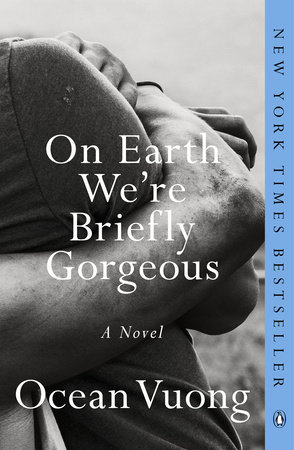An instant New York Times Bestseller!
Longlisted for the 2019 National Book Award for Fiction, the Carnegie Medal in Fiction, the 2019 Aspen Words Literacy Prize, and the PEN/Hemingway Debut Novel Award
Named one of the most anticipated books of 2019 by Vulture, Entertainment Weekly, Buzzfeed, Los Angeles Times, Boston Globe, Oprah.com, Huffington Post, The A.V. Club, Nylon, The Week, The Rumpus, The Millions, The Guardian, Publishers Weekly, and more.
“A lyrical work of self-discovery that’s shockingly intimate and insistently universal…Not so much briefly gorgeous as permanently stunning.” —Ron Charles, The Washington Post
Poet Ocean Vuong’s debut novel is a shattering portrait of a family, a first love, and the redemptive power of storytelling
On Earth We’re Briefly Gorgeous is a letter from a son to a mother who cannot read. Written when the speaker, Little Dog, is in his late twenties, the letter unearths a family’s history that began before he was born — a history whose epicenter is rooted in Vietnam — and serves as a doorway into parts of his life his mother has never known, all of it leading to an unforgettable revelation. At once a witness to the fraught yet undeniable love between a single mother and her son, it is also a brutally honest exploration of race, class, and masculinity. Asking questions central to our American moment, immersed as we are in addiction, violence, and trauma, but undergirded by compassion and tenderness, On Earth We’re Briefly Gorgeous is as much about the power of telling one’s own story as it is about the obliterating silence of not being heard.
With stunning urgency and grace, Ocean Vuong writes of people caught between disparate worlds, and asks how we heal and rescue one another without forsaking who we are. The question of how to survive, and how to make of it a kind of joy, powers the most important debut novel of many years.
“In order to survive, Little Dog has to receive and reject another kind of violence, too: he must see his mother through the American eyes that scan her for weakness and incompetence and, at best, disregard her, the way that evil spirits might ignore a child named for a little dog. There is a staggering tenderness in the way that Little Dog holds all of this within himself, absorbing it and refusing to pass it on. Reading ‘On Earth We’re Briefly Gorgeous’ can feel like watching an act of endurance art, or a slow, strange piece of magic in which bones become sonatas, to borrow one of Vuong’s metaphors.” —Jia Tolentino, The New Yorker
“Vuong is masterly at creating indelible, impressionistic images…Vuong beautifully evokes [Trevor’s] seductive power over Little Dog: This is some of the most moving writing I’ve read about two boys experimenting together…The book is brilliant in the way it pays attention not to what our thoughts make us feel, but to what our feelings make us think. To what kinds of truth does feeling lead? Oscar Wilde famously quipped that sentimentalism is wanting to have an emotion without paying for it, but Little Dog has paid and paid, and the truths arrived at in this book are valuable precisely because they are steeped in feeling.” —Justin Torres, The New York Times Book Review
“[Vuong’s] first foray into fiction is poetic in the deepest sense—not merely on the level of language, but in its structure and its intelligence…The result is an uncategorizable hybrid of what reads like memoir, bildungsroman, and book-length poem. More important than labels, though, is the novel's earnest and open-hearted belief in the necessity of stories and language for our survival. A raw and incandescently written foray into fiction by one of our most gifted poets.”—Kirkus
“Casting a truly literary spell, Vuong's tale of language and origin, beauty and the power of story, is an enrapturing first novel.”—Booklist
“Ocean Vuong runs up against the limits of language—this book is addressed to a mother who cannot read it—and expands our sense of what literature can make visible, thinkable, felt across borders and generations and genres. This is a courageous, embodied inquiry into the tangle of colonial and personal histories. It is also a gorgeous argument for astonishment over irony—for the transformative possibilities of love.”—Ben Lerner, author of Leaving the Atocha Station and 10:04
“One is not often given the chance to apply words like “brilliant” and “remarkable” to any novels, certainly not first novels. Thank you, Ocean Vuong, for this brilliant and remarkable first novel."—Michael Cunningham, author of The Hours


